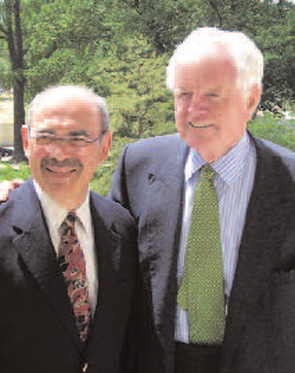
Yes, that’s me with Senator Edward M. “Ted” Kennedy (D-Mass.) in Washington, D.C., this past May (at right). As we reported in The Rheumatologist last month, members of the ACR board of directors and I spent the morning of May 10 meeting with our members of Congress on Capitol Hill. Our visits were well received, and we met with representatives or their staff from over 60 offices. It was an opportunity to talk about the issues of importance to rheumatology, and yes, for a photo or two.
Access to a sitting senator, and one of such esteem and influence (whatever your politics may be), doesn’t always come easy. We were able to arrange this meeting because of a personal contact of mine who knows the senator’s former chief of staff. But our meeting with Sen. Kennedy was more than just a photo op: this 45-year veteran of politics spent more than thirty minutes with us, keenly aware of the issues facing medicine and the patients we treat. At the end of our meeting, he even asked for our opinion on the issue of follow-on biologics (aka generic biologics).

Why I Care so Much
In June, I spoke about why I still like being a rheumatologist – the “still” being in reference as much to the current environment of medicine and all of its hassles as it was to my three decades of being in practice. That column touched a chord with many of you, and you took time out of your day to write me and tell me why you still like being a rheumatologist. Many of you also touched on the hassles of practicing medicine today, and lamented that it didn’t seem like it was going to change any time soon.
I’m often asked why I spend time volunteering for the ACR and organized medicine. It’s enlightened self-interest more than anything: it is unlikely that anyone will look out for me better than I can look out for myself. I have to be a part of trying to make positive changes in medicine, for rheumatology and for our patients. I don’t see it as a choice, and it is not in me to abdicate this responsibility to others.
You see, the solution to these issues lie in our ability to effectively (and tirelessly) advocate. It’s an inescapable part of our existence in today’s world. The world is divided into two kinds of people: observers and participants. As a rheumatologist or a healthcare professional, if you’re complaining about the state of medicine today, you need to be a participant in the efforts to address and resolve these issues.
How You Can Help
We need you, now more than ever. Here are the top 11 ways you can get involved in advocating for rheumatology and for yourself:
1 Develop a personal relationship with your representatives in Congress and their staff. Visit them while you’re in Washington, D.C., or at their home offices in your state. ACR member Sharad Lakhanpal, MD, used his long political involvement to obtain Rep. Frank Pallone (D-N.J.), chair of the Energy and Commerce subcommittee on Health, as the keynote speaker for the ACR Board of Director’s meeting in Washington, D.C., this past May. Rep. Pallone’s committee has jurisdiction over general healthcare issues, including the Arthritis Prevention Control and Cure Act of 2007 (H.R.1283).
2 Invite your Congressional representatives or a member of their staff to spend a day in your office. ACR member Al Denio, MD, demonstrated impressive leadership by inviting his Congresswoman, Rep. Thelma Drake (R-VA), to visit his office this year during Congress’ spring recess. During the visit, Rep. Drake witnessed DXA screenings and the value of having the procedure performed in an office as opposed to a hospital. She spoke to a patient receiving intravenous biologic therapy for RA. As a result of the visit, Rep. Drake signed on as a co-sponsor to the Arthritis Act and agreed to write a letter to the Centers for Medicare & Medicaid Services regarding IV ibandronate. Allowing members of Congress to witness firsthand the daily routines within a rheumatology office gives them great perspective on the severity of the patients’ conditions, importance of the procedures, reimbursement needs of physicians, and necessity for research on arthritis and other rheumatic diseases.
3 Attend fundraising events for state and national candidates. Contribute if you are supportive of their efforts. Volunteer your time to election campaigns. All politics are local, and cultivating relationships at the inception of someone’s service (or at the time of re-election) is an invaluable opportunity.
4 When asked to do so, write letters to Congress. Go to www.rheumatology.org and click our Legislative Action Center, www.capwiz.com/acr. There you can read about the issues we’re currently advocating for. We offer tools you can use to easily find your members of Congress and send them your thoughts. We offer prepared letters on these issues, and encourage you to add your own personal story. You can always contact our Government Affairs department to assist you in your efforts; they are ready, willing, and able to help make your voice heard.
5 Display an ACR advocacy recruitment easel in your office. These tabletop easels contain pre-addressed postcards that patients can mail to the ACR to become involved with our advocacy efforts.
6 Subscribe to the ACR advocacy list serve. Again, go to www.rheumatology.org and select Networking List Serves from the Practice menu. Join the conversation and hear about what others are doing in their communities and states to advance rheumatology’s agenda for better medicine.
7 Cultivate relationships with medical directors in insurance companies your practice interacts with, and serve on insurance company advisory boards.
8 Serve as the rheumatology representative for Medicare’s rheumatology advisory committee when such positions become available.
9 Join the American Medical Association to ensure that rheumatology is represented in this influential advocacy organization.
10 Take a leadership role in your local or state rheumatology society. If there’s not a society for your community, start one.
11 Volunteer for the ACR. The Rheumatologic Care, Government Affairs, Research, and Quality Measures committees, as well as many ARHP committees, all have advocacy functions. There is a particular need to identify younger rheumatologists within their first 10 to 15 years of practice to be sure the ACR effectively represents your perspective.
I ask that you join other dedicated members in advocacy efforts. Engaging in advocacy efforts can take as little as a few minutes of your time, but you can reap so much in return. Do it for our patients, for our profession, and most of all, for yourself.
Dr. Birnbaum is president of ACR. Contact him via e-mail at [email protected].

